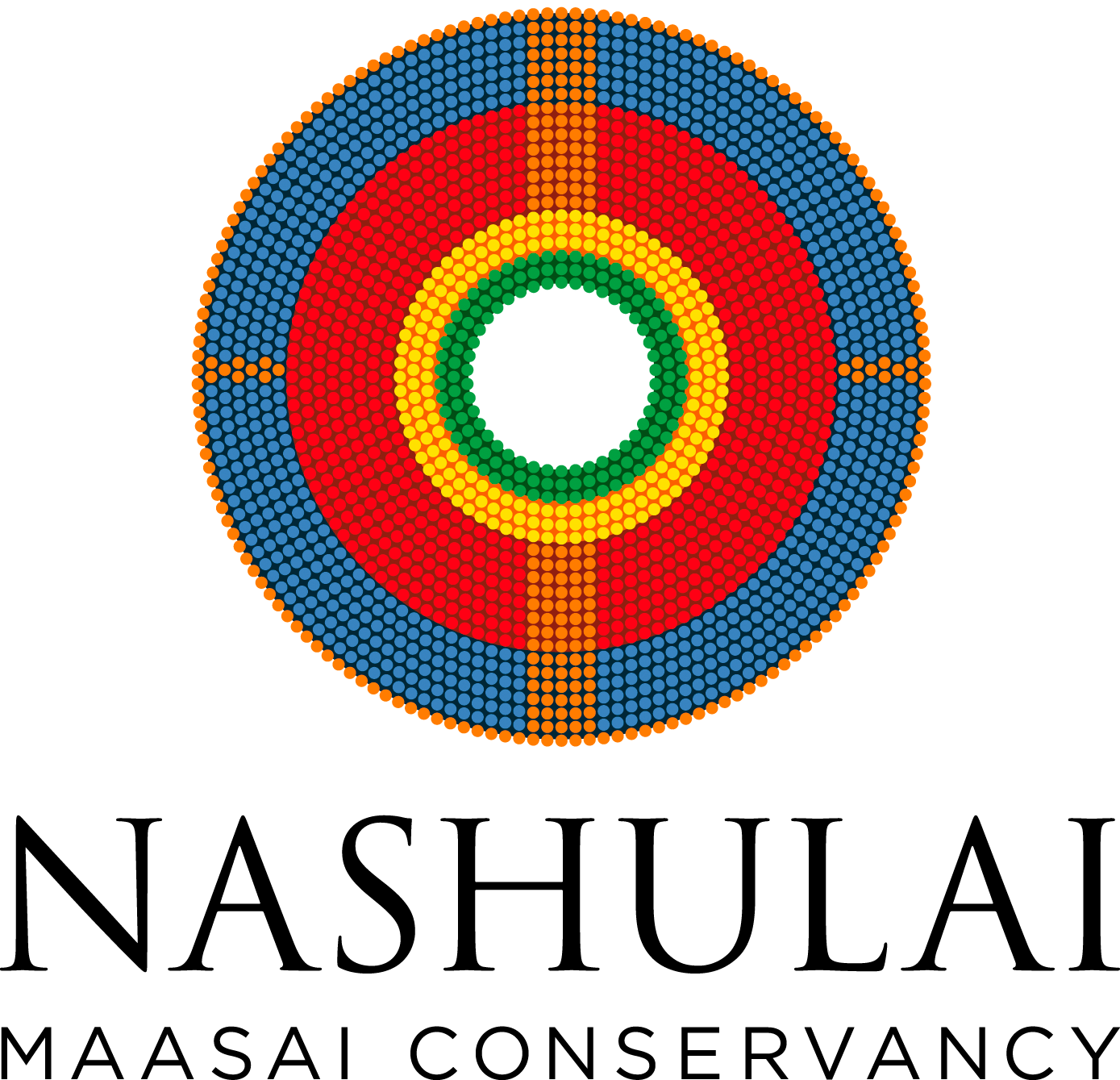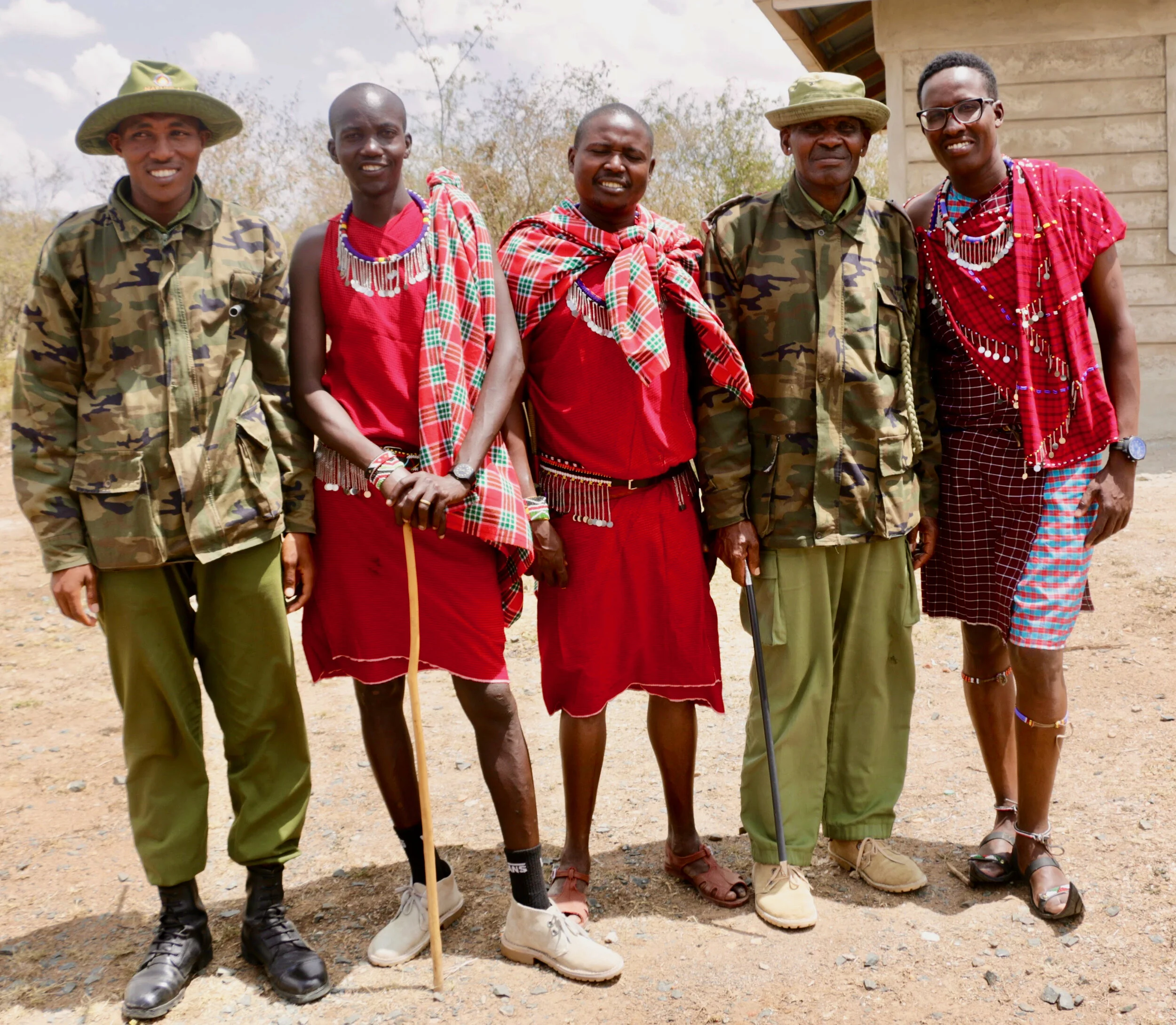Our Nashulai Rangers are the backbone of the entire conservancy, protecting both wildlife and the people who live here. Recruited from the villages across Nashulai, they act as the first line of defense against poaching, human-wildlife conflict, and habitat destruction, ensuring harmony in our mixed model conservancy.
Rangers: Maasai Conservation Warriors of the 21st Century
An elegant Maasai warrior, wearing a red shuka, leaning on his pastoral stick, has long been the icon of Kenya. Now our rangers are the Maasai warriors of the 21st century.
Our rangers are drawn from the conservancy’s communities. They know and love this land. They have put their trust in the conservancy’s success because they believe it’s an honor to protect their land and this invaluable ecosystem on behalf of the entire world.
They are led by Warden Joseph Kasaine Ole Kosikir, a Maasai Elder and, we’re proud to say, a winner of the 2018 Alibaba African Ranger Award! After years in the British and Kenyan armies he returned to the Mara to be a part of our mission. Warden Kosikir provides our rangers with 3 months training before they work in the field. All our rangers are officially trained and (once funded) Nashulai will commence training female rangers as well. Warden Kosikir’s training program is so successful that three other conservancies in the Mara have now sent their own rangers to get training at Nashulai.
By reopening the migratory and connecting corridors at Nashulai there’s been an massive return of wildlife taking up both temporary and permanently residence at our conservancy. We’re home to a bird sanctuary and an elephant nursery, so there’s lots of births at Nashulai. Our rangers not only protect our wildlife from poaching but work proactively to prevent wildlife harassment and human-wildlife conflicts from occurring
“We are part of a rebirth. The ecosystem is regenerating before our eyes. There’s been an incredible return of wildlife to Nashulai. Elephants, lions, wildebeest... the animals vote with their feet.”
Joseph Kasaine Ole Kosikir — Chief Warden of Nashulai
Winning the hearts and minds of the community
All Nashulai Rangers come from local communities. As the alleviation of poverty and the protection of wildlife go hand in hand, the economic empowerment from Ranger’s salaries are vital in creating popular support for Nashulai. As the primary cause of poaching is poverty (indeed 4 of Nashulai’s rangers are rehabilitated poachers!) the economic benefits from employment at Nashulai are vital to encouraging residents to protect their shared ecological resource.
“I used to be a notorious poacher. But I changed. Because of Nashulai I now work as a ranger in the conservancy to protect the animals. I can afford to feed and educate my children. That changes everything.” Emmanuel Ole Soit (Chui) — Nashulai Ranger
Their connection to their communities also allows our rangers to have a greater awareness of going ons at and possible threats to the conservancy.
Support Our Rangers
Given the village and family structures of the Maasai, each ranger has some 20 dependents relying on their income. They could make more money working in cities, poaching, or on Big Conservancy safaris. Yet every one of them is here because they believe in what Nashulai represents: they are themselves investors in this special place.
They’ve earned Nashulai’s gratitude. Our goal is to provide them with proper remuneration. We hope that others in the world will show their appreciation for them and their mission by supporting The Nashulai Rangers Fund.
The Ranger’s Responsibilities
1. Conducting patrols
Our 19 scouts patrol daily in groups of 4 to 8 from 4am (sunrise is peak time for animal and bird activity) until around 4pm when they return to base to review their findings before heading out on night patrols. Long-range patrols cover remote areas and last 5-7 days (longer in monsoon season when the terrain can become impassable); they sleep in the forest at night to protect it and the wildlife. During dry season, a large proportion of time is also spent combating fires -- both natural and man-made fires can occur in any place, and while some small-scale fires are beneficial, on a larger scale they can be devastating to the ecology.
Nashulai Rangers are the eyes and ears of the forest and the grasslands.
2. Monitoring Wildlife and the Environment
The rangers record sightings of animal and bird species and capture pugmarks (paw prints) or scat; they look for signs of illegal activity such as poaching, wildlife trading, charcoal burning and logging, and take legal action in accordance with Kenya’s laws. The villagers, being acutely aware of the goings-on within their communities, are in turn a supportive source of information about poachers and other illegal activity.
3. Managing Human-Wildlife Conflicts
Our rangers protection encompasses the villagers: in taking down the 25 km of fencing to reopen the migration corridors, the people knew they would be exposing themselves to more wildlife encounters as, for example, they make their way to the river for water or the children to school (we recently acquired a school bus to make sure the children are never at risk).
Nashulai is all about building a future where people live in harmony and balance with nature.
4. Engaging Local Maasai Communities
A ranger’s work doesn’t stop with patrolling and protection! New conservation science shows that the most effective forms of conservation involve the local people who know the land intimately. So an important aspect of their work is providing guidance on the importance of biodiversity and the impact of ecological degradation; encouraging garbage collection (with plans afoot to bring the children on board with zero waste), hygiene and ecologically sustainable living.
5. Guiding Guests of Nashulai
The rangers are expert guides—who but the people who actually live there know the land better? Their deep local knowledge of animal behavior is invaluable for species spotting, and their love for their home is contagious.
Since Nashulai is a conservation area, we keep traffic to a minimum. A select number of guests at our nearby Wageni Safari Camp on the outskirts of the conservancy are uniquely welcomed in, guided by the scouts themselves.
The Nashulai Rangers Fund
(Just 3 simple things)
A living wage: Given their role in restoring and sustaining the ecosystem in this important, fragile part of Africa, our rangers deserve a living wage that will support their families and provide their children with the basic necessities and access to education. And while their’ pay is modest, the new steady income has already had a beneficial impact, served to reduce ill health and keep children in school, ensuring they don’t drop out for lack of school fees.
Investment in basic equipment is essential to doing their jobs and to their daily (and nightly) safety--from good shoes to safe transportation. Currently we rely on 3 bush motorcycles across 6000-acres; by upgrading to two 4X4 jeeps they can cover more ground more swiftly and safely and be less exposed to danger in wildlife conflicts or in apprehending poachers. They can also better serve the necessities of life: for instance, a pregnant woman facing challenges could be transported quickly to hospital--a service not presently easily available.
Conservation technology: We’re working towards adopting effective 21st century conservation technology. By upgrading to smartphones we can implement the Spatial Monitoring And Reporting Tool (SMART), the gold standard in community-based conservation software. Using SMART will revolutionize our measuring and evaluations, and improve the effectiveness of wildlife law enforcement patrols and site (conservancy) management at Nashulai, allowing our rangers to perform their jobs more accurately and efficiently.
With the essential goals of the Nashulai Rangers Fund met, we will be able to maintain Nashulai, secure our people and protect a Natural World Heritage site for future generation
To all our friends and to those who would support our efforts:
Ashe oleng! Thank you very much!







